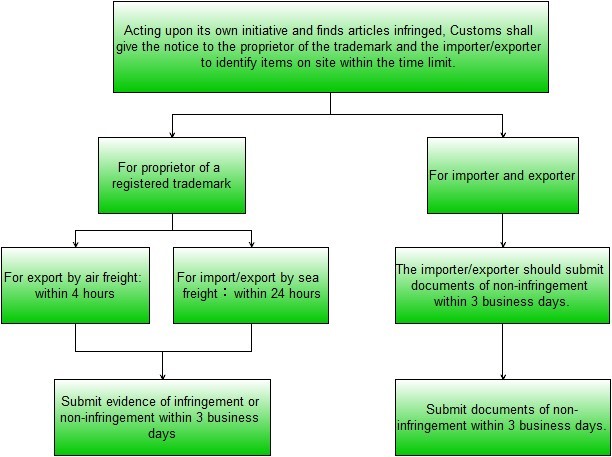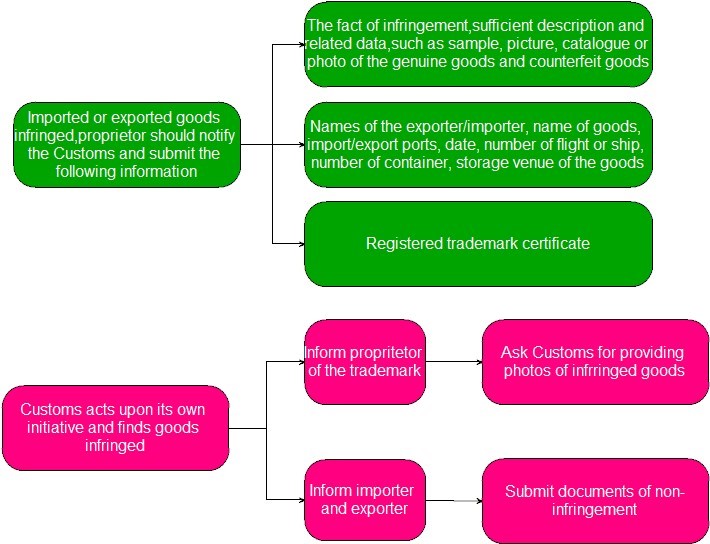- Legal Service
- Border Protection
Border Protection

Source: Customs Administration, Ministry of Finance, https://web.customs.gov.tw/etaichung/singlehtml/475db77d9ff64b17a10b955b04053574
Border Protection Measures of Trademarks in Taiwan
This article is to introduce border protection measures of trademarks according to the related laws and practices in Taiwan, and how trademark owners may protect their rights through Customs.
Implementation procedures for customs to detain articles infringing the rights in the trademark are enacted pursuant to Articles 72 to 77 of the Trademark Act, and delegation authorized government agency and Customs to stipulate particulars is pursuant to Article 78 of that Act.
According to the Trademark Act, there are two types for detention:
1. Application to Customs for detention: A proprietor of a registered trademark may file an application to Customs for detention of articles that are suspected of infringing the rights of a trademark. (Article 72 of the Trademark Act)
2. Suspension by Customs: Where Customs acting on its own initiative finds imported or exported articles where there is prima facie evidence that a trademark might have been infringed, Customs shall give a notice to the proprietor of the trademark and the importer/exporter.
In giving the notice referred to in the preceding paragraph, Customs shall specify a time span for the proprietor of the trademark to come to identify the infringement and furnish proof of infringement, and Customs shall also specify a period for the importer/exporter to furnish proof of non-infringement. However, the time span may be extended once only, by application of the proprietor of the trademark or the importer/exporter to Customs in writing, stating legitimate reasons for failure to furnish proof. (Article 75 of the Trademark Act).

Regulations governing Customs Measures in Protecting the Rights and Interests of Trademark by virtue of Paragraph 2 of Article 78 of the Trademark Act, provide concrete guidelines for Customs to follow on implementing border protection measures regarding trademark rights. The regulations ruling on the expiry, required documents, and other related matters about Customs implementation measures for protecting trademark rights are described as follows:
Where Customs acts upon its own initiative and finds that imported or exported articles acquired with prima facie evidence suggesting that a trademark right is likely to have been infringed, Customs shall give a notice to the proprietor of the trademark and the importers/exporters. The proprietor of a registered trademark and exporter/importer should follow the procedures below after receiving the aforementioned notification:
1. The proprietor of a registered trademark shall identify the items in question on-site within four (4) hours for export cargos by air freight, and within twenty-four (24) hours for import/export cargos by sea freight and import goods by air freight, and then sub-mit evidence of infringement or non-infringement within three (3) business days. Anyone failing to provide such evidence in time should apply in writing with a legitimate reason for an extension of additional three (3) business days prior to the expiry. Application for extension is acceptable once only.
2. The importer/exporter should submit documents of non-infringement within three (3) business days. Anyone failing to provide such evidence in time should apply in writing with a legitimate reason for additional three (3) business days prior to the deadline. Application for extension is acceptable once only.

In the event that the proprietor of a registered trademark lodges a complaint that specific imported or exported goods have infringed on his or her trademark, he/she should notify the Customs and submit the following information:
1.The details of the infringement and sufficient description to identify the infringing goods. The proprietor of a registered trademark should also provide related information in electronic file, such as sample, picture, catalogue or photo of the genuine goods and counterfeit goods.
2.Related specific information including details of the exporter/importer, details of the goods, import/export ports, date, number of flight or ship, number of container, storage venue of the goods.
3.Registered trademark certificate must be presented.
On the other hand, where Customs acts upon its own initiatives and finds that imported or exported articles acquired with prima facie evidence that a trademark right is likely to be infringed, Customs shall give a notice to the proprietor of the trademark and the importer/exporter. After receiving the notification, the proprietor of a registered trademark may make a request to Customs to provide photo files of suspected infringing goods so as to determine whether to identify the goods on-site or not.

